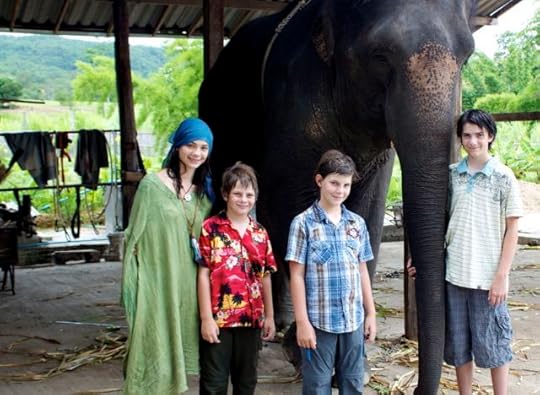Rolf Potts's Blog, page 66
March 14, 2013
Boost your writing opportunities in the developing world
Vagablogging :: Rolf Potts Vagabonding Blog
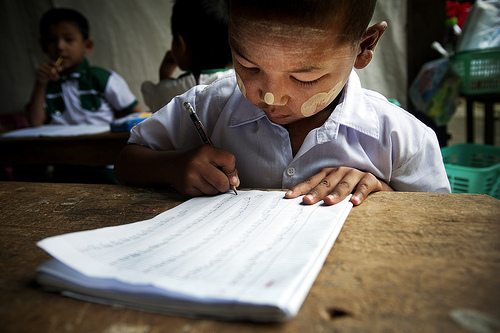
Picture credit: Flickr/ United Nations Photo
When I moved to Asia in 2007, I was still tied under the wheels of the Machine, back home. Everything I was doing, experiencing, and trying to translate into a piece of writing, or any other form of “artistic text”, I did so with the wish that someone, back home, would recognize my efforts and get me that publishing deal I had wished for so much in virtue of my brave choice of moving abroad.
Reality is often different from our dreams. Especially when coming from a culturally under developing nation such as Italy, where trying to be an “artist” is guaranteed to put a very sorry expression across any parental face. Back then, it was with a sense of scorn that I looked at all the rejections, the nos and the maybes, as it dawned on me that, wherever I may have roamed, I was destined to be a total failure.
Still, I put together a blog, I chose the best pieces out of it and edited them for good and self-published an Italian written book on my life as a teacher in small town China. I cannot say it was successful, as it was not. It was just barely ok not to hang the keyboard to the wall, and start playing badminton instead.
It was at that point that I travelled, and travelled, and travelled deeper and wider all across East Asia. When I finally stopped again, as Hank Williams put it “No more darkness, no more night. Now I’m so happy, no sorrow in sight. Praise the Lord, I saw the light …”
Facing the most sacred Buddha statue in the Lama temple of Beijing, China, I bowed down and I expressed my wish. Maybe I was thinking that through such a foreign surrogate I would have reached my own, white-faced version of God. Well, I was wrong. Those Asian ears were indeed openly listening to my call. Slowly – as good things do not happen overnight -, I found out that I had overlooked what was happening around me. Exactly in the place I was living THEN. Developing countries have plenty of opportunities. Otherwise, they would not be called as such, I guess?
Asian publishers are not much different from Western ones, but possibly, they accept submission, and you do not need an agent, or spend too much money on it. It is still a tough process, but at least you will get rejection letters. Sometimes even explaining what is wrong with your stuff. The hard work is still there, the results are, however, greatest in the East. In a single hard working year, I have published more than I ever did in the past 5 or 6, kicked off the road by frustration, rejection, and let me tell it, a great dose of assholism.
My suggestion to all the wannabe writers (and another cite to one of the best movies of all times): when there is no more room in hell, look around wherever you are, and start pitching left and right. Then, your articles and stories will walk the earth.
MARCO FERRARESE explored 50 countries and lives in Penang, Malaysia since 2009. He is currently a PhD candidate at Monash University’s Sunway Campus, Kuala Lumpur, researching the anthropology of punk rock and heavy metal in Southeast Asia. Besides his academic endeavors, he blogs about overland Asian travel and extreme music in Asia at www.monkeyrockworld.com
Original article can be found here: Boost your writing opportunities in the developing world
March 12, 2013
Location Independence: The intersection of work and travel
Vagablogging :: Rolf Potts Vagabonding Blog
Location Independence is a concept that has exploded over the past few years. With the rapid expansion of the internet, all of a sudden, there are possibilities that didn’t exist, even a decade and a half ago. Travel has long sung her siren song in the hearts of many arm chair gypsies and now many of those folks, who previously burned with longing, find themselves able to hit the road and travel without giving up their careers.
It’s easy to see the draw: photos of folks working, poolside, books like The Four Hour Work Week, and countless blogs of evangelical nature bend “come hither” fingers at those “stuck” in their 9-5 with some level of discontent. But is it all it’s cracked up to be?
It’s one thing to save up and take a gap year, or work in spurts as you go, tucking into a contract for a few months and then traveling in free wheeling style for a few months. For many, that’s the perfect blend. But what is it like to truly work from the road, to hold down proper careers in a nomadic life? We do it. We know quite a few others who do it.
And here’s what I have to say: It’s a hell of a lot of work.
Juggling time zones, clients and projects across continents is not for the faint of heart. There are some very real benefits to being able to deliver during your clients’ off hours, and the combination of a lack of overhead and lower living costs in many popular overseas locations sweetens the deal. But the trade off is often that working from these “more desirable” locations is also more difficult, logistically, linguistically and in terms of connectivity.
It’s not a question of whether it is “worth it.” For those of us living and working location independent as we travel, it is most certainly worth it. But that should not be confused with it being “easy” or equated with working whilst on perpetual vacation. Work is work. Where it happens might be becoming increasingly negotiable, but the facts are the same. I think there is a certain amount of snake-oil-salesmanship going on right now in the community of books and blogs being promoted that suggest that it is otherwise. There are many examples of people who go big in their first year or two and blow hard about it, but where are they three or four years in? Very few continue in the lifestyle.
We’re five years in at this point. We live and work on the road. We make “real money” from “real career” type efforts and support a family of six. We pay taxes, we have insurance and investments. It’s not a gap year or a phase of a fling. It can be done, and we have a wide array of folks we could point to who are doing it. We’d encourage anyone who wants to that it’s possible and you can be your own rainmaker, in work, travel and lifestyle. But we’ll also tell you that it’s tough. There’s no free lunch, and anyone who says there is, is selling something.
Are you location independent in your career or do you want to be? Do you choose to work and travel? What has been your experience?
Original article can be found here: Location Independence: The intersection of work and travel
March 10, 2013
Travel writers: Eleanor Stanford
Vagablogging :: Rolf Potts Vagabonding Blog
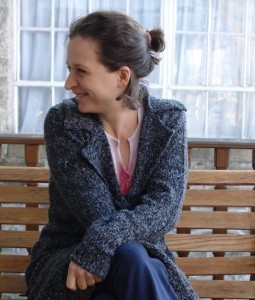 Eleanor Stanford’s memoir, Historia, Historia: Two Years in the Cape Verde Islands, is out this month from the Chicago Center for Literature and Photography. Her first book, The Book of Sleep
Eleanor Stanford’s memoir, Historia, Historia: Two Years in the Cape Verde Islands, is out this month from the Chicago Center for Literature and Photography. Her first book, The Book of Sleep  , was published in 2008 by Carnegie Mellon Press. Her poems and essays have appeared in Poetry, Ploughshares, The Harvard Review, The Massachusetts Review, and many other journals. She lives in the Philadelphia area.
, was published in 2008 by Carnegie Mellon Press. Her poems and essays have appeared in Poetry, Ploughshares, The Harvard Review, The Massachusetts Review, and many other journals. She lives in the Philadelphia area.
How did you get started traveling?
When I graduated from college I joined the Peace Corps and was sent to Cape Verde, West Africa. While I was in the Peace Corps, I visited four of the nine islands that comprise Cape Verde, and Senegal as well. Both living and traveling as a Peace Corps volunteer gave me a clearer understanding of the sort of travel I was interested in doing: that is, not so much traveling, as living in a place long enough to have an inside view of what it was like. The next time I had such an opportunity was ten years later, when my husband and I moved to Salvador, Brazil with our three sons to work at an international school there.
How did you get started writing?
I started writing poetry when I was in college, then immediately after college I joined the Peace Corps, where I continued to write. When I returned to the States, I enrolled in an English Ph.D. program, hated it, and went to get my MFA in creative writing instead.
What do you consider your first “break” as a writer?
Having a poem accepted for publication in Poetry magazine when I was twenty-five. I remember standing on my front porch in Madison, Wisconsin, reading the letter and nearly hyperventilating. The poem later went on to win Poetry’s Union Arts and Civics award, which carried a prize of $1000, no small sum in the world of poetry publication.
As a traveler and fact/story gatherer, what is your biggest challenge on the road?
At this point in my life, with three little kids, my biggest challenge is getting out the door.
What is your biggest challenge in the research and writing process?
Finding the time, between family life and teaching obligations. Other than that, the writing itself is always a challenge, in its own frustrating, thrilling, mysterious way.
What is your biggest challenge from a business standpoint?
Finances and promotion. Especially as someone who is primarily a poet, these areas don’t come naturally to me, nor do they seem, to be honest, a natural outgrowth of or corollary to writing. I do promotion as best I can, with a lot of help from more adept friends and family.
Have you ever done other work to make ends meet?
All the time. I’ve been a Peace Corps volunteer, graduate teaching assistant, and high school guidance counselor in Brazil. Now I am an adjunct English and creative writing professor. (All of which are, sadly, only marginally more lucrative than writing.)
What travel authors or books might you recommend and/or have influenced you?
I’m inspired by journals and biographies of eighteenth and nineteenth century explorers and naturalists: Maria Sibylla Merian in Surinam, Lewis and Clark, Henry Bates in the Amazon, Darwin in Galápagos and my beloved Cape Verde. More recently, Geoff Dyer and John Jeremiah Sullivan. Also, poetry: Elizabeth Bishop in Brazil, Fernando Pessoa packing his bags for nowhere at all .
.
And, as a much-needed antidote to much travel writing, Jamaica Kincaid’s A Small Place: “You needn’t let that funny feeling you have from time to time about exploitation, oppression, domination develop into full-fledged unease, discomfort; you could ruin your holiday.”
What advice and/or warnings would you give to someone who is considering going into travel writing?
From my own experience, I would suggest writing and traveling for the joy of it, and finding another way to support oneself financially. But that’s just me — if you can find a way to make it work otherwise, more power to you.
What is the biggest reward of life as a travel writer?
The way that each experience, traveling and writing, deepens the other: traveling gives you something compelling to write about, and writing allows you to assimilate and reflect upon your travels in a more meaningful way–and hopefully to share the experience with readers as well.
Original article can be found here: Travel writers: Eleanor Stanford
March 7, 2013
Teaching Asians the Vagabonding way
Vagablogging :: Rolf Potts Vagabonding Blog
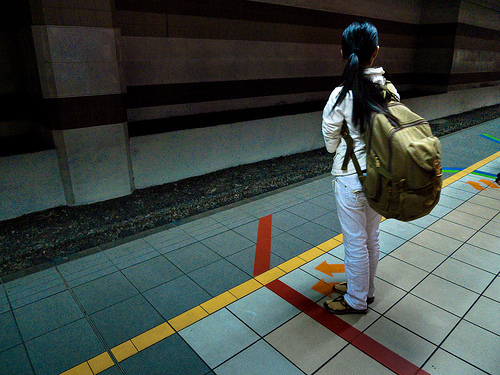
Picture credit:Flickr/WarzauWynn
A couple weeks ago I have witnessed something quite interesting: I won’t name the company, as this is not the place to make some free advertising, BUT I was quite entertained and shocked to learn that in Malaysia, someone has decided to teach people how to travel on a budget. Obviously, for a price.
I have attended the press conference of a Malaysian company that is offering “backpacking tours” to interesting Asian destinations such as Mongolia, India and Tibet, offering a full vagabonding adventure under the tutorial of a guide. They won’t pay for your meals, they will make you sleep in gers and tents, and they will teach you how to take great travel photography. Still, you will pay to get out of your comfort zone, and have fun learning the backpacking style under expert supervision. Cool, isn’t it?
I liked the idea: as many Asians I met complain about safety issues and high costs of travel, and seem to be alien to the concept of backpacking and traveling independently without buying a full package tour, this seems to be a welcome educational improvement coming from Malaysia.
I reflected that, in Asia, what we take for granted may not be the same: a stronger money and family ethic, and the fear of the unknown are common among the young. Plus, they struggle to create their own critical thinking identities. For sure, there are quite a number of Asian backpackers on the road already, including Japanese, Taiwanese, Malaysians, Chinese, South Koreans and some Indians. But I think that, as the majority prefers organized tours, by offering a modest package to understand adventure travel and backpacking ethics, this company has made a right choice in its market.
How do you consider such an idea in the West? Do you know of any Western companies offering this sort of educational backpacking travel? Please comment below.
MARCO FERRARESE explored 50 countries and lives in Penang, Malaysia since 2009. He is currently a PhD candidate at Monash University’s Sunway Campus, Kuala Lumpur, researching the anthropology of punk rock and heavy metal in Southeast Asia. Besides his academic endeavors, he blogs about overland Asian travel and extreme music in Asia at www.monkeyrockworld.com
Original article can be found here: Teaching Asians the Vagabonding way
March 5, 2013
A Traveling Child’s Best Feature
Vagablogging :: Rolf Potts Vagabonding Blog
I’m pretty sure my kids don’t appreciate the life that they have.
They say they do. They recognize that their life is not normal. But really, I don’t think they get it.
They have no frame of reference for what it means to sit in a classroom for eight hours a day, every day, for instance. How can they appreciate the freedom of their educational experience without that?
None of them can ever remember a time when their experience included any less than two countries, or three languages, at a minimum. That American culture is what defines “normal” doesn’t even occur to them. They like it here. They like that everyone speaks English, that the bathrooms don’t cost a quarter to use, that we can use washing machines instead of hand washing in buckets and that their best friends are within driving distance, but they like other places too.
We got an old book about Tunisia off of a free shelf yesterday. Elisha flipped through the pages, pointing out the places we visited and the town we lived in. “This makes me homesick, Mama,” he sighed.
Technically, our kids are American, THIS is their home… but when you’re homeless by choice and the world is your classroom citizenships get blurry and it turns out that the globe shrinks quite a bit and we end up homesick for somewhere almost all of the time.
My kids definitely don’t appreciate the life that they have. I’m not sure ANY kid appreciates the life that he has, not really. It isn’t until much later that we develop the perspective on what was, vs. what could have been, vs. what is possible that any of us appreciate our life or our choices for what they are. Perhaps that lack of appreciation is really my kids’ best feature. A complete lack of perspective allows them to just grow up, take it all in, not be overly impressed by any of it, and assimilate it all into whoever they are in the end. It’s fun to watch.
Original article can be found here: A Traveling Child’s Best Feature
March 4, 2013
How much time do I need to spend each day roadschooling my children?
Vagablogging :: Rolf Potts Vagabonding Blog
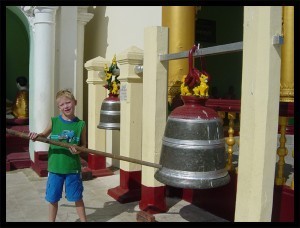
My son, ringing the bell in a Burmese temple
“A school day is about five hours, and that doesn’t even include homework time,” a letter I recently received asked. “How can I make sure my children will learn just as much (and hopefully more) while roadschooling? I like to believe education is not as efficient at school as it can be at home (or the road) since there’s only one teacher with twenty or more children, and at school is less likely to be child-led. Nevertheless, it seems like you still need a lot of time per week where education is the main goal.”
You’d be surprised. When your life revolves around education, you end up spending very little time on it.
I know that sounds weird. What I’m trying to say is that as you travel, you’ll be doing this stuff anyway. You’ll go to national parks and explore the visitor centers and listen to ranger talks. That’s all “school.” You’ll take hikes around battlefields and talk about the wars that happened there as you walk. That’s “school” too.
Every time you visit a cheese factory or a zoo, when you play in tidal pools along the coast or race up sand dunes, it’s “school.” Take advantage of every opportunity to get out and play, and your kids will be in school all the time.
In the evenings, after a long day of playing tourist, you’ll need some down time – that’s when your kids will reach for books to relax with. There’s your reading for the day. Before they go to bed, have them spend a few minutes writing a journal entry.
You don’t have to stress about it – you really don’t.
Nancy Sathre-Vogel is a 21-year classroom veteran who make the decision to leave the classroom for a life on the road. Together with her husband and twin sons, she spent a total of four years traveling the Americas on bicycle roadschooling her children, including a journey from Alaska to Argentina. For more information about educating your child on the road, visit her site at www.familyonbikes.org.
Original article can be found here: How much time do I need to spend each day roadschooling my children?
March 3, 2013
Where are you headed next, and why? (Free t-shirts at stake.)
Vagablogging :: Rolf Potts Vagabonding Blog
 Ten years ago this month, when I was touring around the United States promoting my then-recently released book Vagabonding, I handed out stickers that featured the letters “VGB” in a little white oval (not unlike the international license plate “country code” sticker one might see on cars in Europe). The purpose of the sticker, I told folks, was to help a person stay motivated as he or she planned and saved money for some future trip. Affixed to a car (or a dorm wall, or an office cubicle, or some other visible place), the VGB could be a reminder to oneself and one’s community that the person in question had made the decision — they were committing themselves to a vagabonding adventure, be it a few weeks or few years into the future.
Ten years ago this month, when I was touring around the United States promoting my then-recently released book Vagabonding, I handed out stickers that featured the letters “VGB” in a little white oval (not unlike the international license plate “country code” sticker one might see on cars in Europe). The purpose of the sticker, I told folks, was to help a person stay motivated as he or she planned and saved money for some future trip. Affixed to a car (or a dorm wall, or an office cubicle, or some other visible place), the VGB could be a reminder to oneself and one’s community that the person in question had made the decision — they were committing themselves to a vagabonding adventure, be it a few weeks or few years into the future.
I’ve since run out of VGB stickers, but — thanks to this blog’s friends at tshirtprinting.org — I’d like to give away VGB t-shirts to ten Vagablogging readers who are in the process of planning a vagabonding journey. To put yourself in the running, just reply to this post with an answer to the question: Where are you headed next, and why? Feel free to add details about your destination, your motivation, your fears/ambitions for the trip, and how you’re currently planning and saving for it. Be sure to include contact details — or follow the post in coming days — so that we’ll know how to reach you and send you a shirt if you’re one of the lucky ten. Happy vagabonding, everyone!
Original article can be found here: Where are you headed next, and why? (Free t-shirts at stake.)
February 28, 2013
The end of the backpacking trail for Nomadic Matt?
Vagablogging :: Rolf Potts Vagabonding Blog
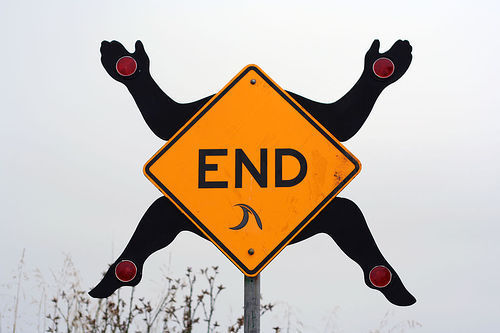
picture credit: Flickr/niallkennedy
I stumbled upon a list of the most popular travel sites in the world and ended up reading this post from Nomadic Matt, rated as number one: apparently, he is not “nomadic” anymore, as he has settled down in New York City. Crawling back to the other links embedded in the post, I gained a better understanding of Matt’s end as a perennial backpacker: he doesn’t feel like doing it anymore by himself. He feels alone. He says that “Africa made it clear that it’s time to move on to a new chapter of my life. I couldn’t hold onto the past any longer. What I want from my life now doesn’t involve any more late nights on the backpacker trail.”
Well… I have to be honest and I may lose some friends here: I have never been a big fan of Matt. For sure, he may teach to many how to manage a web travel business and life on the road, but I remember having read an interview a few years ago, where he claimed he did not want to visit China and he preferred Thailand, and this somehow stuck with me. I had been living in China for one year at the time, and I kind of felt that statement as truly out of step with MY world. Like, me and Matt were walking completely opposite directions, and not because of my love/hate relationship with China, but for the way we both look at the world. Thus I didn’t bother about following Matt’s ongoing travels up to earlier today, when I randomly bumped into his confession. But for sure, I can support his ultimate decision to leave the backpacker trail behind, in search for something more enlightening.
I had a quick glance through his blog, and I realized that he may still be in his 20s. This may explain quite a few of his choices. Personally, I have never enjoyed any “late nights on the backpacker trail” even when at 15 I went alone to Switzerland to march for world peace. I would get extremely irritated if I found some doped out person blabbering gibberish around me, and I would scream if I realized that people were having sex in the dorm we were sharing: I applied the same philosophy around the punk scenes and squats I dwelled all around the Western – and currently, the Asian – world. And believe me: they may stink more than a hostel’s unwashed toilet, and make the “backpacker life” look like a sorority girl’s weekend – one of the good girls, mind you!!.
Anyhow, I progressively abandoned the hostel scene after a few months on the road as I felt it was extremely pre-packaged and dull to me. I was trying to varying effects to connect with the locals and the lunatics I found along my way, as much as I could. Couchsurfing was helpful. Knocking on doors was random and fun, at times just stupid. But it gave me a way out of the backpacker world, and one way into my own. And do not tell me this is biased and I am bragging: I did spend of course some time along the trail, otherwise I could not choose for myself where I want to stand. I occasionally bump into it again, but I am not very excited. And I am far from drawing lines or chasing stereotypes here: good folks are everywhere… even at the hostels, eheheh…
But when I found a partner in Malaysia, everything changed: things that looked alien, different, incomprehensible to me before, started to open up and make sense. I do not feel any sort of attraction for hostels and backpackers at all anymore. I honestly do not even bother with the taxonomy, in the first place, anymore. The local made me rethink my relations with my own similar people. It really just seemed alien to me, to be interested in never-ending parties: I like to go a bit deeper, make sense of what’s going on behind me, above me, beyond me… If this is the reason why Matt has stopped traveling, well… I guess it’s for his best. I am confident he will find a renewed push to make his travels more rewarding, like everyone else who, after a long sting on the road, is experiencing his same kind of blues. What do you think??
MARCO FERRARESE explored 50 countries and lives in Penang, Malaysia since 2009. He is currently a PhD candidate at Monash University’s Sunway Campus, Kuala Lumpur, researching the anthropology of punk rock and heavy metal in Southeast Asia. Besides his academic endeavors, he blogs about overland Asian travel and extreme music in Asia at www.monkeyrockworld.com
Original article can be found here: The end of the backpacking trail for Nomadic Matt?
February 26, 2013
What’s in your health kit?
Vagablogging :: Rolf Potts Vagabonding Blog
The question has been asked lots of times: What do you have in your health kit?
First, let me say that we have a three pronged approach to healthcare, at home and abroad: staying well, and treating illness & emergency care. I’ll share what we carry with us for all three.
Staying Well
This includes eating healthy foods, getting plenty of sleep and decent hygiene.
To that end we carry with us:
Kefir grains (for their probiotic benefit, brewed and consumed daily)
Sprouting seeds (lots of vitamins and nutrients in sprouts to boost health)
Yogurt and cheese cultures (yes, we make our own yogurt and cheese as we travel)
Grapefruit Seed Crush Extract: for gut health, natural antibiotic and as a fruit & veggie wash
The following supplements from BeeYoutiful:
Ultra-immune
Super Mom Vitamins
Super Dad Vitamins
Bee-immune
Spirulina
Treating Illness
Anyone who’s traveled much will tell you that virtually everything you need can be had anywhere you go, and sometimes much less expensively than at home. This is true. What is also true is that when you most need it is often the time it’s least convenient to go on a hunt for it. To that end, we carry a pretty extensive medical kit for treating basic illness, including (but not limited to)
Ibuprofen & Paracetemol
Percocet
Prescription migraine meds (Relpax)
Anti-diarrheals
AZO (UTI meds)
Anti-fungal cream
Benadryl
Albuterol inhalers
Cough and common cold meds
Campho-phenique
2 full prescriptions of anti-biotics
Ear oil
Anti-nausea meds
Emergencies
We carry health and emergency evacuation insurance as we travel. We know lots of people who go without it, but we also know a few who are alive because they had it. We’re not willing to gamble when it matters most. We also carry the following in our health kit for emergencies.
Bandaids and bandages of all sizes
Chemically activated cold packs
Electrolyte replacement powders
Triple anti-biotic creams
Burn spray & colloidal silver burn cream
Blister and burn bandages
A needle kit including syringes & IV start
Suture kits
We’ve had some criticism on those last two items. It seems that some people think that we’re a bit over the top for carrying a stick kit and suturing supplies and one person even intimated that it was irresponsible for us to suggest that other should carry something they aren’t trained to use.
Let me explain:
We are carrying them because we found ourselves in a situation where we needed a kid stitched up in Guatemala and the healthcare center didn’t have a suture kit. They didn’t have butterfly bandages either. They ended up field taping the ten year old’s hand up and giving him a round of antibiotics (which I’m not a big fan of) to ward off infection.
I’m carrying the needles, etc. so that I can take them with me for the doctors to use, not because I’m going to stitch my own kid up in the forest instead of seek proper care. Although, if it came down to it, I’d do my best in an extreme situation.
I realized, the day that we didn’t have what we needed to put Elisha back together, that we were very lucky that it wasn’t more serious. I realized that, in an extreme situation, if I had the choice between a dirty needle or the potential death of a kid, I’d gamble on the dirty needle. The reality is, if I’m better prepared, I’ll never have to make that choice. The needle kit was immediately added to our bag.
Could we be carrying more: of course.
Could we do with less: certainly.
For us, this is the balance we’ve struck between being prepared for the worst and trying to ensure the best possible health situation for our family.
What’s in your family’s travel medical kit?
Original article can be found here: What’s in your health kit?
February 25, 2013
The Joys of Fairy-Winged Freedom
Vagablogging :: Rolf Potts Vagabonding Blog
Even though many do not understand my life-style choice, I am free. I am totally, insanely free to do as I please, go where I want, and stay as long as I choose.
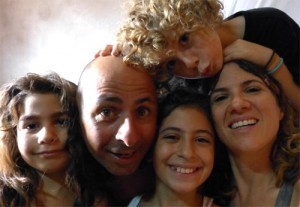 My family has lived with the indigenous in the jungles of Peru, hitchhiked on back of pick-ups in Costa Rica, scuba dived off the Sea of Thailand, and plan to trek the Annapurna Circuit this fall. We homeschool our kids according to an inspired curriculum that we’re making up as we go, and spend most of our time pursuing what we’re deeply passionate about. I’ve lost 28 pounds, written a few books, and have learned to strum the guitar competently enough to entertain my family, but obviously not good enough for public as I was booed off-stage in a Sihanoukville, Cambodia bar for trying. Though many claim we are abusing our children by gallivanting the globe, we cuddle in the mornings, take two-three hour lunches, and my husband is currently lulling them to sleep by reading A Wrinkle In Time.
My family has lived with the indigenous in the jungles of Peru, hitchhiked on back of pick-ups in Costa Rica, scuba dived off the Sea of Thailand, and plan to trek the Annapurna Circuit this fall. We homeschool our kids according to an inspired curriculum that we’re making up as we go, and spend most of our time pursuing what we’re deeply passionate about. I’ve lost 28 pounds, written a few books, and have learned to strum the guitar competently enough to entertain my family, but obviously not good enough for public as I was booed off-stage in a Sihanoukville, Cambodia bar for trying. Though many claim we are abusing our children by gallivanting the globe, we cuddle in the mornings, take two-three hour lunches, and my husband is currently lulling them to sleep by reading A Wrinkle In Time.
When Nancy asked me to share the joys we’ve gotten from world travel, the seemingly simple task morphed into mammoth before my eyes. Summarize. How? Entering our now third year of non-stop world travel has been beyond unreal. How can you encapsulate the relationships, memories, and vistas from an RV, tent, ranch, village, home-stays, one tarantula-filled attic, and innumerable backpacker hostels? Though I’ve most famously conveyed it in I Know Nothing And 99 Other Things The Road Has Taught Me, I can never fully articulate the endless joy that comes with world travel, and with family discoveries such as that my oldest daughter is hysterical, my son composes songs with the words “boobs’ in it, and youngest writes me love letters with adorable, yet profound mantras like last month’s ” Sometimes, I miss myself.”
As if a kind-hearted angel sprinkled her magic dust upon us, we no longer fight, get lost and confused, depressed, mad, or over-tired. We are in perfect family Utopia. All is perfect in our nomadic family life, including this lie.
 You see, friends, our globetrotting freedom has been a blessed gift that we do not take for granted. And still, we’re so normal. I still freak out over wet towels on the floor, incessant whining, and unwashed dinner dishes. And even though I have never felt more aware, awake, and alive, I am, and anyone who has traveled, is still, just a soul on their own rainbow journey through themselves to the light. If anyone tells you their world travel adventures have made them 100% worry-free and happy, be wary.
You see, friends, our globetrotting freedom has been a blessed gift that we do not take for granted. And still, we’re so normal. I still freak out over wet towels on the floor, incessant whining, and unwashed dinner dishes. And even though I have never felt more aware, awake, and alive, I am, and anyone who has traveled, is still, just a soul on their own rainbow journey through themselves to the light. If anyone tells you their world travel adventures have made them 100% worry-free and happy, be wary.
Family world travel has more joys than I can possibly verbalize, but maybe most notably is the gift of knowing that we are a normal, healthy family with all the natural stretch-marks and ruffled feathers that come when five opinionated souls grow intimately and experience real life together.
Insanely unorthodox, embarrassingly honest, and on a path towards spiritual awareness, Gabi Klaf blogs about her family’s ups and downs in their now third year of non-stop budget world travel. She is a guitar-stumming, energy-healing, ADHD wind-loving scaredy cat.
Original article can be found here: The Joys of Fairy-Winged Freedom
Rolf Potts's Blog
- Rolf Potts's profile
- 323 followers



